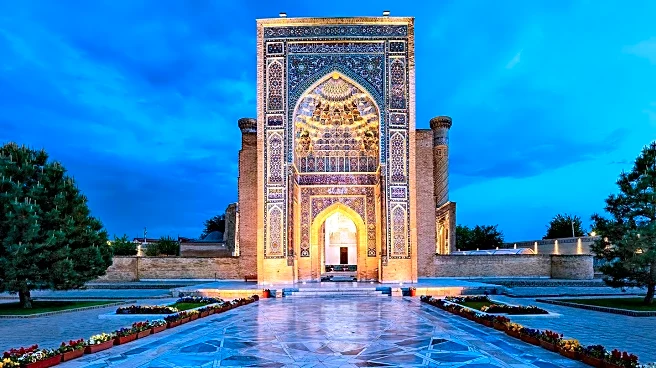What is the story about?
What's Happening?
Sara Raza has been appointed as the new artistic director and chief curator of Uzbekistan's Centre for Contemporary Art in Tashkent. Raza, who has a background in curating international art exhibitions, aims to bring insights from her experiences in London to engage the youth of Tashkent. The Centre for Contemporary Art, housed in a restored tram depot, is undergoing refurbishment to expand its exhibition space. Raza plans to launch artist residencies and engage with the local community, emphasizing the importance of reaching out to audiences rather than expecting them to visit the venue.
Why It's Important?
Raza's appointment signifies a shift towards international collaboration and cultural exchange in Uzbekistan's art scene. Her focus on engaging the youth and local communities reflects a broader trend of inclusivity and accessibility in the arts. The expansion of the Centre for Contemporary Art and the introduction of artist residencies could enhance Uzbekistan's cultural landscape and foster creativity among young artists. This development may also strengthen Uzbekistan's international presence in the art world, attracting global attention and collaboration.
What's Next?
The Centre for Contemporary Art in Tashkent is expected to reopen in 2026, following the completion of its refurbishment. Raza will continue to develop programs that engage the local community and promote cultural exchange. The success of these initiatives could influence the future direction of Uzbekistan's cultural policies and its role in the international art scene. As the Centre expands its activities, it may attract more artists and visitors, contributing to the cultural and economic development of the region.
Beyond the Headlines
Raza's approach to curating art in Uzbekistan highlights the potential for cultural diplomacy and the role of art in addressing social issues. Her emphasis on reaching out to communities and engaging with diverse audiences reflects a commitment to inclusivity and social impact. The Centre for Contemporary Art's initiatives could serve as a model for other cultural institutions seeking to engage with local communities and promote cultural exchange.
















